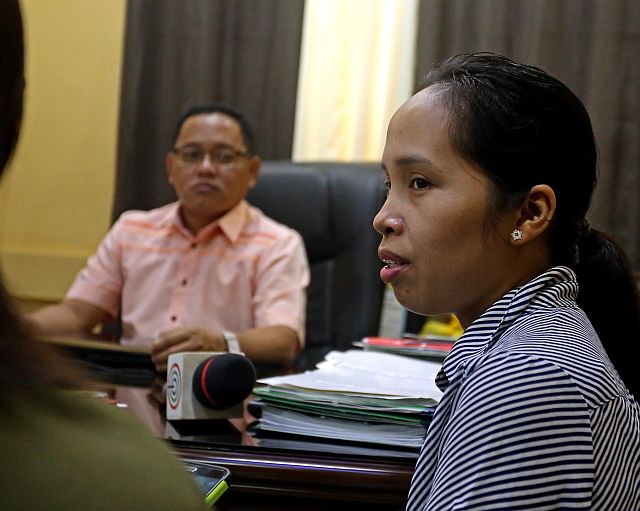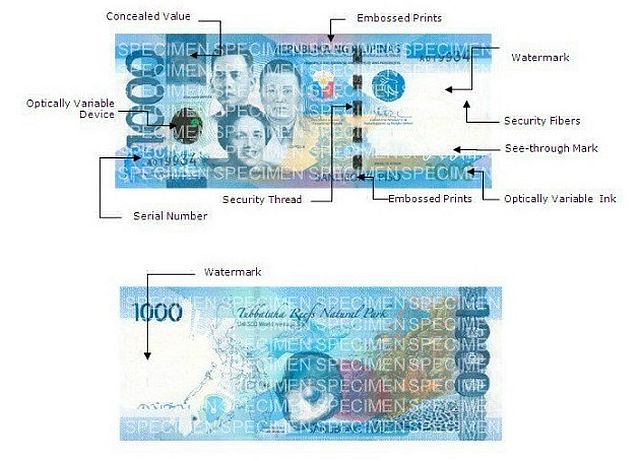BSP to cash handlers: Learn security features of peso bills

Regine Padernal, operations manager of Josh Internet Cafe, vowed never to allow printing of money in any of their branches after Junrey Cagay used one of their branches to print counterfeit money. She visited Cebu City Councilor Dave Tumulak yesterday to assure him of their cooperation. (CDN PHOTO/LITO TECSON)
The Bangko Sentral ng Pilipinas (BSP) urged businessmen, vendors and cash handlers to learn how to tell fake bills from the genuine ones by familiarizing themselves with the security features of the Philippine currency.
The New Generation Currency (NGC) notes, launched on December 16, 2010, replacing the New Design Series, contain state-of-the-art security features, which BSP wants the public to be familiar with. Among these security features are the special paper being used, a watermark figure and embedded metallic threads.
Following the arrest of 28-year-old Junrey Cagay last Saturday for the manufacture of fake peso bills, the BSP shared anew tips on how to deal with situations involving counterfeit money.
Lawyer Leonides Sumbi, BSP Cebu regional director, said those who doubt the genuineness of the bills being presented to them should not take the money.
“If they strongly doubt the note, then they shouldn’t receive it. Or they could ask for another denomination, have it changed. Instead of a twenty, they can ask for two P10 coins or if it’s a 1,000-peso bill, they can ask for two P500 bills,” she said.
If the presenter fails to produce alternatives, then the consumer should reject the transaction altogether.
Sumbi also said that consumers may ask the presenter to turn the bills over to the police or BSP to have it checked.
“The police more or less also have an idea which are fake and which are real. But they may directly go to the BSP. We have the expertise to tell, although we don’t give the final determination. Our staff here are trained to guide the public,” she explained.
The BSP’s Currency Issue and Integrity Office (CIIO), as an investigating body, determines whether bills are fake or not.
“We don’t exchange (fake bills for genuine ones). Otherwise, people will manufacture more counterfeits and its circulation will increase,” said Sumbi.
Warning
Meanwhile, Cebu City Councilor Dave Tumulak asked internet cafes and printing shops to prohibit the printing of money.
He said printing money bills should only be allowed if it bears the words “toy” or “play money.”
“We warn all internet cafes and all printing shops. Avoid printing bills. You will be held responsible,” he said in a press conference Monday morning.
Tumulak met with a representative of Josh Internet Cafe, where Cagay printed fake peso bills. Cagay was arrested by police last Saturday.
Regine Padernal, operations manager of Josh Internet Cafe which has 36 branches all over Metro Cebu, told Tumulak that it was the first time this happened in any of their shops.

SOURCE: BSP
She vowed that it would never happen again and said they are willing to support any investigation by the police or the BSP on the matter.
Despite Padernal’s assurances, Tumulak said that they may still be impleaded in the case that will be filed by the BSP against Cagay.
When sought for comment, Cebu City Mayor Tomas Osmeña said what happened was just an isolated case.
“The problem is not perceived to be blatant. It is an isolated case as of this moment,” he said in his press conference yesterday.
Laws and penalties
Section 50 of Republic Act No. 7653 or the BSP Charter states that the central bank has the sole power and authority to issue currency within the territory of the Philippines.
Sumbi clarified that those who merely pass on these counterfeit notes, such as through the payment for transactions or services, do not have any liability.
She added that the same goes for stores as it would be difficult to trace where the fake money came from.
However, she said that those proven to pass fake bills despite knowledge of them being counterfeit may be held liable under the law.
Under Article 166 of the Revised Penal Code, circulating counterfeit money in connivance with forgers is punishable by 12 years to 20 years imprisonment and a fine not more than P10,000.
On the other hand, if it is not in connivance with forgers, circulation or use of fake money is punishable with a penalty of six to 12 years of imprisonment under Article 168 of the same code.
Disclaimer: The comments uploaded on this site do not necessarily represent or reflect the views of management and owner of Cebudailynews. We reserve the right to exclude comments that we deem to be inconsistent with our editorial standards.
